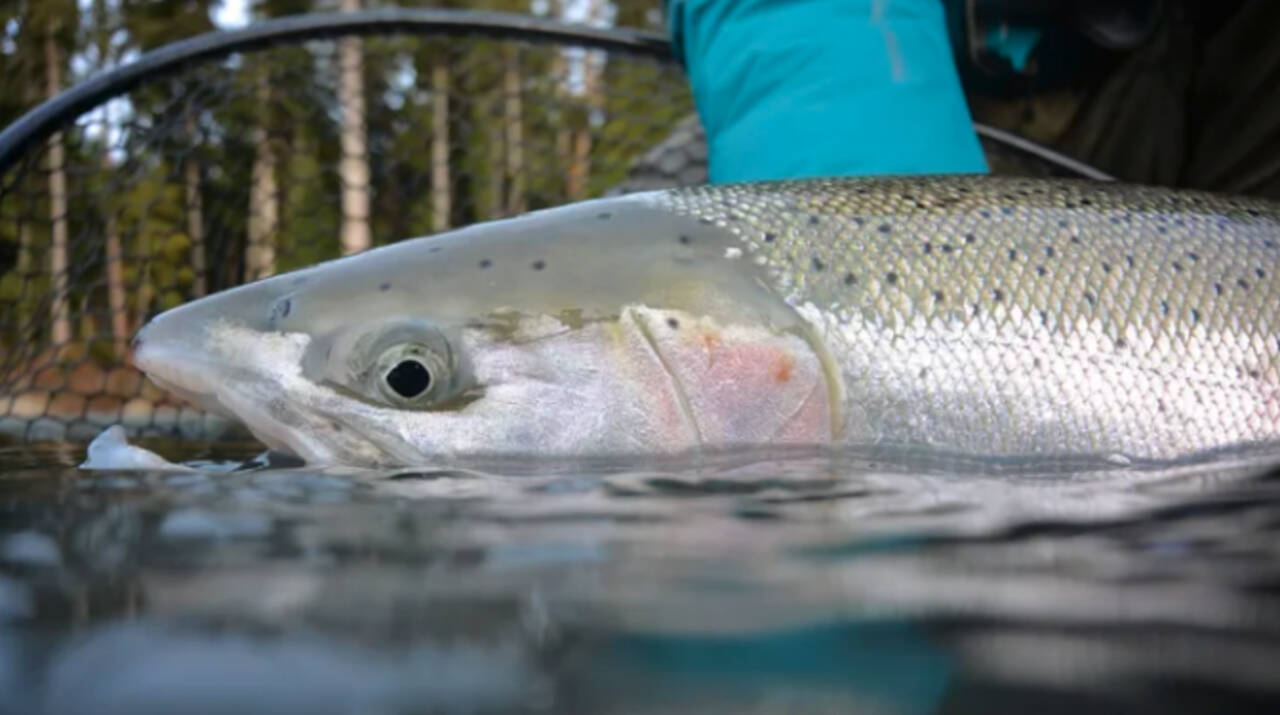PORT ANGELES — To protect declining populations of wild steelhead, Olympic National Park is closing the Queets, Salmon and Quinault rivers to sport fishing Monday.
The sport fishing closures are due to low forecasted returns, anticipated commercial harvest outside of the park, and declining trends in total run size with chronically low escapements of wild steelhead, according to an Olympic National Park statement. The park and state escapement goals are 4,200 wild steelhead in the Queets system and 1,600 in the Upper Quinault system. Peninsula steelhead were recently petitioned for listing under the Endangered Species Act.
“Given the low numbers, we are compelled to use the one remaining tool to minimize impacts on wild steelhead — pausing sport fishing inside the park. We understand that these closures affect sport anglers and fishing guides, and we appreciate their cooperation in helping to protect these precious wild resources,” said Olympic National Park Superintendent Sula Jacobs.
Olympic National Park has had significant concerns for wild steelhead in these rivers based on long-term declines in annual run sizes and escapements dating back to 1980. Record low returns of wild steelhead were recorded in the Queets and Quinault systems in the last few years. Of additional concern is that wild steelhead have failed to reach the state and National Park Service escapement goals in eight of the last 10 years in the Queets and six of the last 10 years in Upper Quinault.
Beginning Monday, the closures include the Queets River, the Salmon River and the Quinault River from the upper bridge downstream to the park boundary.
More razor digs
OLYMPIA — Razor clams will be ready to dig beginning today, the Washington Department of Fish and Wildlife confirmed this week.
Not all beaches are open for every dig, so diggers are encouraged to make sure their intended destination is open before heading out.
“By luck of the draw, the tide charts have aligned to allow for some nice sunset low tides starting Friday of the Thanksgiving holiday weekend,” said Bryce Blumenthal, a WDFW coastal shellfish biologist.
Optimal digging occurs between one and two hours before the listed time of low tide. The following digs during afternoon and evening low tides will proceed as scheduled, after marine toxin results from the Washington Department of Health showed razor clams are safe to eat:
• Today, 4:18 p.m.; 0.0 feet; Long Beach, Twin Harbors, Copalis.
• Saturday, 5:05 p.m.; -0.7 feet; Long Beach, Twin Harbors, Mocrocks.
• Sunday, 5:49 p.m.; -1.2 feet; Long Beach, Twin Harbors, Copalis.
• Monday, 6:31 p.m.; -1.3 feet; Long Beach, Twin Harbors, Mocrocks.
• Tuesday, 7:12 p.m.; -1.2 feet; Long Beach, Twin Harbors, Copalis.
• Wednesday, 7:52 p.m.; -0.8 feet; Mocrocks.
Final approval of marine toxin testing usually occurs about a week or less — sometimes two to three days — before the start of each digging series. Below are additional tentative dates:
• Dec. 13, Wednesday, 6:55 p.m.; -1.3 feet; Long Beach, Twin Harbors, Mocrocks.
• Dec. 14, Thursday, 7:39 p.m.; -1.3 feet; Long Beach, Twin Harbors, Copalis.
• Dec. 15, Friday, 8:25 p.m.; -1.2 feet; Long Beach, Twin Harbors, Mocrocks.
• Dec. 16, Saturday, 9:12 p.m.; -0.8 feet; Long Beach, Twin Harbors, Copalis.
• Dec. 17, Sunday, 10:01 p.m.; -0.3 feet; Long Beach, Twin Harbors, Mocrocks.
• Dec. 26, Tuesday, 6:18 p.m.; -0.9 feet; Long Beach, Twin Harbors, Copalis.
• Dec. 27, Wednesday, 6:57 p.m.; -0.8 feet; Long Beach, Twin Harbors, Mocrocks.
• Dec. 28, Thursday, 7:35 p.m.; -0.6 feet; Long Beach, Twin Harbors, Copalis.
• Dec. 29, Friday, 8:11 p.m.; -0.3 feet; Long Beach, Twin Harbors, Mocrocks.
On all open beaches, the daily limit is 15 clams per person. Each digger’s clams must be kept in a separate container, and all diggers must keep the first 15 clams they dig, regardless of size or condition, to prevent waste. It’s not unusual to encounter some small clams, especially in the early part of the season.
Proposed changes
WDFW shellfish managers are considering an alternative digging schedule for Copalis and Mocrocks beaches beginning in 2024. The proposed change would open each beach for multiple days rather than alternating openings between areas every other day. For example, during a four-day tide series, Mocrocks would be open Friday and Saturday and Copalis would be open Sunday and Monday. Proposed dates would provide consecutive open dates on each beach in a way that spreads digging opportunity evenly.
The approach to offering consecutive open days may reduce confusion as to which beach is open and create more digging opportunity when only one beach is available for harvest. Tentative digging dates for January and February will be announced in early December.
Orca comments
OLYMPIA — The WDFW is seeking public input on a draft periodic status review for orcas that includes a recommendation to keep the species on Washington’s endangered species list due to the status of the Southern Resident orca population. The public comment period is open until Feb. 19, 2024.
“Due to the continued depleted state of the Southern Resident population, as well as ongoing threats to all Washington orcas, WDFW recommends retaining killer whale[s] as a Washington endangered species,” said Jessica Stocking, WDFW marine coastal flyway section manager.
The draft periodic status review for orcas is now available on the WDFW’s website at www.tinyurl.com/orcastatus. The public can submit written comments via email at TandEppubliccom@dfw.wa.gov or by mailing the Washington Department of Fish and Wildlife ATTN: Taylor Cotten, P.O. Box 43141, Olympia, WA 98504.
The commission is tentatively scheduled to consider this topic in spring 2024.
The Southern Resident population has shown an overall declining trend since 1995, falling from 98 whales to 75 whales as of July 2023. Although Washington’s transient and offshore orca populations are stable or increasing, the species is broadly listed as endangered in Washington due to the status of the imperiled Southern Residents.

